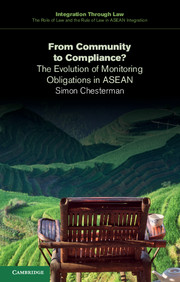1 - ASEAN's Approach to Monitoring
Published online by Cambridge University Press: 05 March 2015
Summary
Historically, ASEAN had little provision for monitoring obligations – arguably because there was little interest in compliance at all. Writing in 1998, the former Secretary-General of ASEAN stated that ASEAN ‘is not and was not meant to be a supranational entity acting independently of its members. It has no regional parliament or council of ministers with law-making powers, no power of enforcement, no judicial system.’ This was consistent with the view that ASEAN was intended to be a kind of social rather than a legal community.
Over time this changed, with the adoption of various agreements that included reporting obligations. The signing of the ASEAN Charter in 2007 signalled a paradigm shift. As Tommy Koh and others argued, the purpose of the Charter was to make ASEAN a more rules-based organisation: ‘The “ASEAN Way” of relying on networking, consultation, mutual accommodation and consensus will not be done away with. It will be supplemented by a new culture of adherence to rules.’ This point was emphasised also in the Report of the Eminent Persons Group, which explicitly linked rule adherence to legal personality. Whether the ‘ASEAN Way’, epitomised by musjawarah (consultation) and mufukat (consensus), is compatible with a rules-based organisation will be a key challenge to the organisation in years to come.
Two obstacles remain. The first is capacity, including the comparatively few resources available to ASEAN in general, and the unfunded mandates created in certain regimes in particular. Writing in 2011, Azmi Mat Akhir optimistically argued that the challenge confronting ASEAN was the need to coordinate the increasingly complex and multi-sectoral activities being undertaken in ASEAN's name. The mandate of the Secretariat, for example, has increased – but only slightly. In the 1976 Agreement establishing the Secretariat, the Secretary-General was given limited responsibilities to ‘ascertain facts or seek clarifications for the purpose of reporting to the Standing Committee for its consideration’ and ‘harmonise, facilitate and monitor progress in the implementation of all approved ASEAN activities’.
- Type
- Chapter
- Information
- From Community to Compliance?The Evolution of Monitoring Obligations in ASEAN, pp. 7 - 58Publisher: Cambridge University PressPrint publication year: 2015



